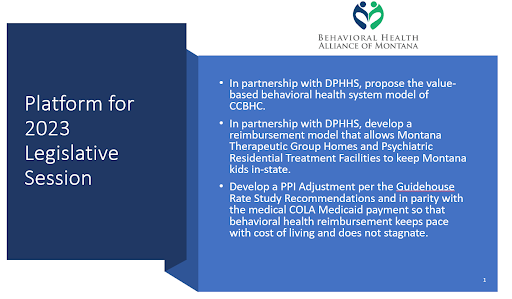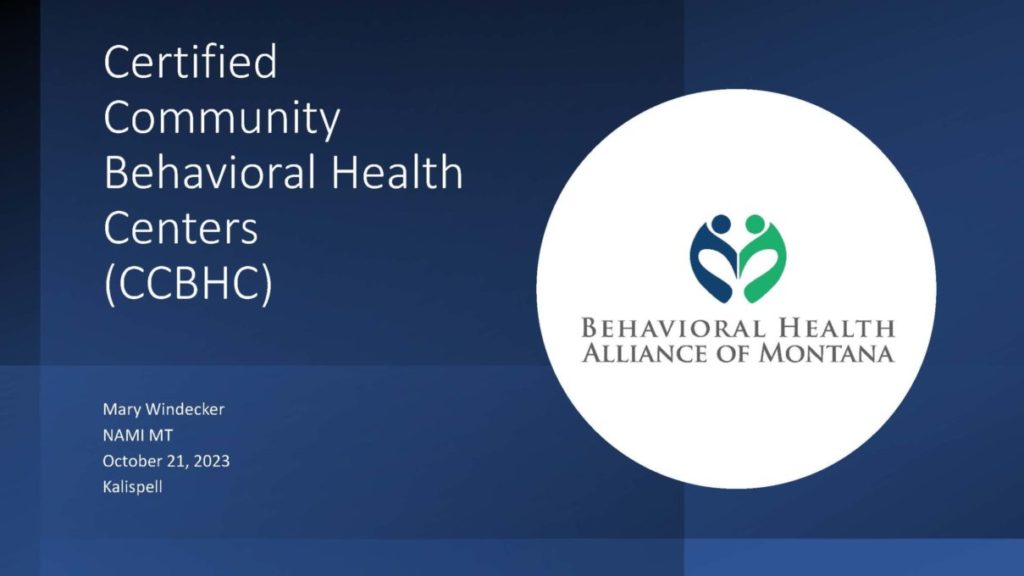
2023 Legislative Session and CCBHCs

At the Behavioral Health Alliance of Montana, we’re helping all of our members work to create sustainable behavioral health in Montana. Both programming and funding have to be sustainable in order to serve the citizens of Montana. See below for updates on our platform priorities! You can also review specifics in our newsletter found under the News and Resources tab.
CERTIFIED COMMUNITY BEHAVIORAL HEALTH CENTERS (CCBHCs)

A Certified Community Behavioral Health Clinic model is designed to ensure access to coordinated comprehensive behavioral health care. CCBHCs are required to serve anyone who requests care for mental health or substance use, regardless of their ability to pay, place of residence, or age – including developmentally appropriate care for children and youth.
CCBHCs must meet standards for the range of services they provide and they are required to get people into care quickly. An important feature of the CCBHC model is that it requires crisis services that are available 24 hours a day, 7 days a week. CCBHCs are required to provide a comprehensive array of behavioral health services so that people who need care are not caught trying to piece together the behavioral health support they need across multiple providers. In addition, CCBHCs must provide care coordination to help people navigate behavioral health care, physical health care, social services, and the other systems they are involved in.
DPHHS, National Council for Mental Wellbeing, BHAM, NAMI MT and others have been educating the legislators on the Health and Human Services Committee and the Part B Budget Committee on CCBHCs. Unfortunately, some of the legislators are still struggling with understanding the model.
In an attempt to boil it down as simply as possible, we’ve come up with this description:
The Certified Community Behavioral Health Centers (CCBHC) would begin the transformational change of the behavioral health system to a comprehensive value-based reimbursement system. That means that the siloed organizations that currently receive fee-for-service would be able to work together in a continuum of care and provide wrap-around services for seriously mentally ill adults and seriously emotionally disturbed children. This is the model that FQHCs and hospitals use so we’re just asking that behavioral health providers also be able to provide care this way.
CCBHC Downloads:
Download the DPHHS Montana CCBHC Implementation Timeline:
Download a PDF of Mary’s CCBHC presentation from the NAMI conference here.
Find out more here Certified Community Behavioral Health Clinics (CCBHCs) | SAMHSA
Download the CCBHC FAQ’s here.
Download Mary’s BHAM Criminal Legal Reform CCBHC Presentation here.
PROVIDER RATE STUDY AND MEDICAID INCREASE TALKING POINTS
Download the talking points related to the Governor’s Medicaid Provider Rate Study here.
March 2023: HB2, the DPHHS budget bill, has moved into the Senate and includes about 94-95% of the provider rate study benchmarks for behavioral health. Caferro’s bill, HB649, that requested the full funding to benchmarks and an annual cost of living adjustment (COLA) for providers was amended to remove the COLA and only provide an additional $5M for provider rate increases. Physicians receive an annual Medicaid COLA by statute and behavioral health providers should receive the same to maintain parity required by law.
Feb. 16, 2023: JAS Appropriations Committee voted to implement additional rate increases for providers in all 3 sectors and also converted the $25M for one-time-only funding to the base for ongoing funding over the biennium. This brings most behavioral health programs closer to the cost of covering care, but there is still a gap with the benchmark reimbursement for many programs. Rep. Mary Caferro has introduced HB 649 that would raise rates to those recommended by the Governor’s Provider Rate Study to cover costs as identified in 2019 data. This will will be heard in Health and Human Services Committee on Feb. 24, 2023. See Talking Points below.
Jan. 3, 2023: The Governor’s proposed budget has come out and includes increases for the four sectors studied in the Medicaid Provider Rate Study: senior and long-term care, developmentally delayed, and adult and children’s mental health and substance use disorder treatment providers.
The comprehensive and objective Governor’s Medicaid rate study found that adult and children’s mental health and substance use treatment providers receive less than 85% on average of the cost of delivering that care. Obviously, a business can’t remain open if they are reimbursed less than their costs. That’s just basic Business 101.
During this legislative session, we’ll be talking with legislators about funding the full recommendations from the Governor’s study.
Advocacy Suggestions:
- The Legislature needs to fund the full recommendations and an annual COLA for community-based behavioral health in your communities as requested in HB649.
- We appreciate the JAS Appropriations Committee providing additional funding, but the rates remain below the basic cost of providing care and should be raised to the full recommended rates from the Governor’s rate study.
- No business can survive being paid less than the cost of care and more homes, beds, and programs will need to be closed unless the full costs are covered.
- My organization will need to lay off _____ FTEs and close ____ homes/programs/beds if the full cost of covering care is not covered by the Medicaid rates.
- Advocate for an annual Medicaid cost-of-living increase for mental health and substance use providers similar to the one that physicians receive. Once we get the rates up to market, we want to make sure that another expensive rate study isn’t required in the future.
- To learn more go to: https://montanabehavioralhealth.org/advocacy/